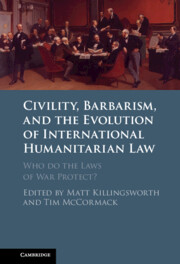 Civility, Barbarism and the Evolution of International Humanitarian Law
Civility, Barbarism and the Evolution of International Humanitarian Law Moral Sentiment and International Humanitarian Law in the Civilising Process
Published online by Cambridge University Press: 11 January 2024
Until quite recently, international relations theory neglected the role of emotions. This chapter surveys the rehabilitation of emotions and moral sentiment in political and international relations theory with a view to examining the cultivation of sympathy as a normative and historical condition of international humanitarian law as a ‘civilising process’. The chapter argues that, as part of a broader ‘civilising process’ to alleviate unnecessary human suffering, moral sentiment has been an indispensable, if ambivalent, factor in the historical pursuit of humanitarian action. The chapter argues that the modern codification of international humanitarian law is predicated on the cultivation of moral sentiments such as sympathy and compassion being extended to those injured or killed on the battlefields.
To save this book to your Kindle, first ensure no-reply@cambridge.org is added to your Approved Personal Document E-mail List under your Personal Document Settings on the Manage Your Content and Devices page of your Amazon account. Then enter the ‘name’ part of your Kindle email address below. Find out more about saving to your Kindle.
Note you can select to save to either the @free.kindle.com or @kindle.com variations. ‘@free.kindle.com’ emails are free but can only be saved to your device when it is connected to wi-fi. ‘@kindle.com’ emails can be delivered even when you are not connected to wi-fi, but note that service fees apply.
Find out more about the Kindle Personal Document Service.
To save content items to your account, please confirm that you agree to abide by our usage policies. If this is the first time you use this feature, you will be asked to authorise Cambridge Core to connect with your account. Find out more about saving content to Dropbox.
To save content items to your account, please confirm that you agree to abide by our usage policies. If this is the first time you use this feature, you will be asked to authorise Cambridge Core to connect with your account. Find out more about saving content to Google Drive.